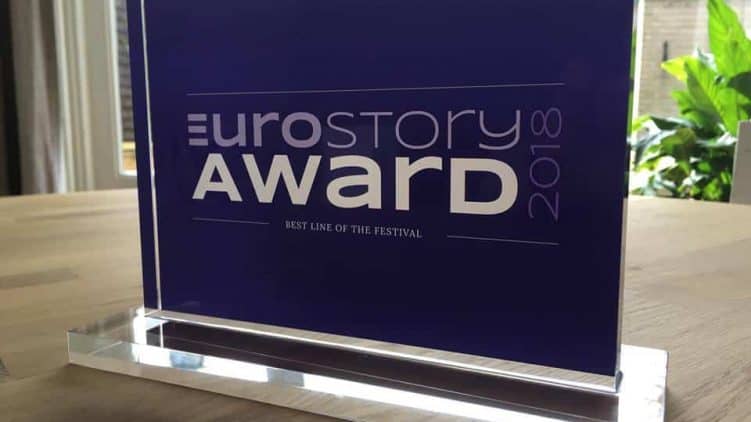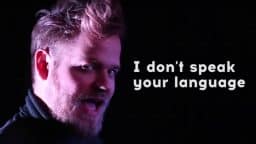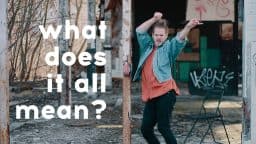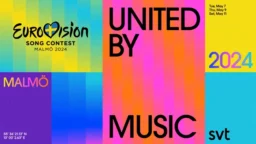Eurostory is once again going through all the lyrics of this year’s Songcontest entries to find the best Eurovision line – the one with the prettiest poetry, the most meaningful metaphor, the most interesting imagery. The winning line – and its author(s) – will receive the Eurostory Award 2018.
Two years ago the award went to Jamala from the Ukraine (who also won that year’s Songcontest) for the line: You think you are gods, but everyone dies.
Last year France won our award, specifically composer and lyricist Nazim Khaled for the beautifully meaningful sentence: Les siècles passent et disparaissent, ce que tu crois être la mort, c’est une saison et rien de plus – Centuries pass and disappear, what you believe to be death is a season and nothing more.
How this works
We nominate nine different lyrics. There is a full explanation below about why we believe this specific selection deserves our nomination. And just as with the Eurovision Song Contest itself, it is then up to a public jury (that means you, here, see our poll) and a jury of professional judges.
The votes from the public poll make up 25% of the final decision, the other 75% is up to the judges, whose panel contains writers, journalists, editors and former Eurovision participants.
The Eurostory team will be presenting the Eurostory Award 2018 to the winner in Lisbon. And we promise you a full report.
So, bring your flair for languages or linguistic instinct and participate in our poll. And remember: it is NOT about the melody or your opinion of the entire song. We are solely looking for the best line of them all. (And thank you ever so much for taking the time to vote – which is possible until May 5th!)
Nominated
What is the price of a madman’s wounds that were opened by your love? (Armenia)
In the song Qami (‘Wind’) the wind is asked why love needs to be so full of despair, and to which degree we are willing to wound ourselves.
Oh, you’re running circles round my mind, I think your words have been my bible (Austria)
You keep haunting my thoughts, and that is of course because I’ve believed in you, and I have wanted to believe. The beauty of this sentence isn’t just the claim that someone’s words have been like a bible, but that the ‘I think’ by the first person narrator shows that he isn’t so sure any more.
Honeybunny up-all-night, wannabe-couplegoals-queen: I know you ‘bop-whop-a-lu bopped’ on his wood bamboo. (Czech Republic)
The lyrics to the song Lie to me are full of neologisms, new invectives and metaphors with a double entendre. We’ve selected this sentence, about which singer Mikolas Josef told us that it had to do with one of his former lovers. Right after she broke up with him, she posted pictures of herself with a new lover online, using the provocative hashtag ‘couplegoals’. That’s where this line originated. And therefore it seems pretty clear to us what that whole bop-whop-a-lu-bopped means…
I am all those children who were taken by the sea: I’ll live a hundred thousand years. (Je suis tous ces enfants que la mer a pris: je vivrai cent mille ans.) (France)
In a song about lost children who were boat refugees, the French tell us about that one child named Mercy. In her we see all the other children who have drowned, ending with the powerful conclusion that they will live for a hundred thousand years.
The Barbie got something to say, hey, hey, hey, hey! (Israel)
Thank heavens there was a country brave enough to send in an entry inspired by the whole #metoo scandal. (Sexism isn’t a topic that is broached often enough at Eurovision). In Toy Netta sings about the objectification of a woman’s body, underlining that a woman has the right to assert herself: ‘I’m taking my Pikachu home’.
Me and my life are like a dog and a cat: my heart is their most expensive toy. (Ja i život, pas i mačka: srce najskuplja mu igračka.) (Montenegro)
In the song Inje, about a lost love, there is also the line: ‘Frost covered us. The blood froze in my veins, and oh, my heart, you shrivel up and forget too quickly.’ But we like the line listed above even better.
It’s a fine, fine line between whiskey and water into wine. (The Netherlands)
In a powerful, rocky song Waylon argues that there is a thug in every single one of us; a rebel, an outlaw. Several lines from Outlaw in ‘em are very well-written, but the very first line is a strong opener: it’s only a very small step from whisky to water-into-wine, a reference to the biblical story in which Jesus turned water into wine during a wedding feast. The triple W-alliteration also doesn’t go unnoticed.
I don’t give my soul to anyone, I hold it for myself: true art, without price. (Svoje duše ne dam nikomur, držim jo za se: prava umetnost, brez-brez cene.) (Slovenia)
In the song Hvala, ne! (‘No, thank you!’) singer Lea Sirk knows how to stand up for herself: I’m saving my soul for me, because it just so happens to be a true, invaluable work of art!
We’re the liars in the face of facts: different weapon but the same attack. (Switzerland)
The Swiss entry Stones is commendable for the rawness with which the contemporary callousness and western indifference are depicted: ‘All saying that life’s hard/ Don’t want it in our backyard… We’re so afraid, we fire away.’ The line that we’ve nominated also hints at the devaluation of substantiating things with facts (‘fake news’).
This article was translated by Sandra C. Hessels.




